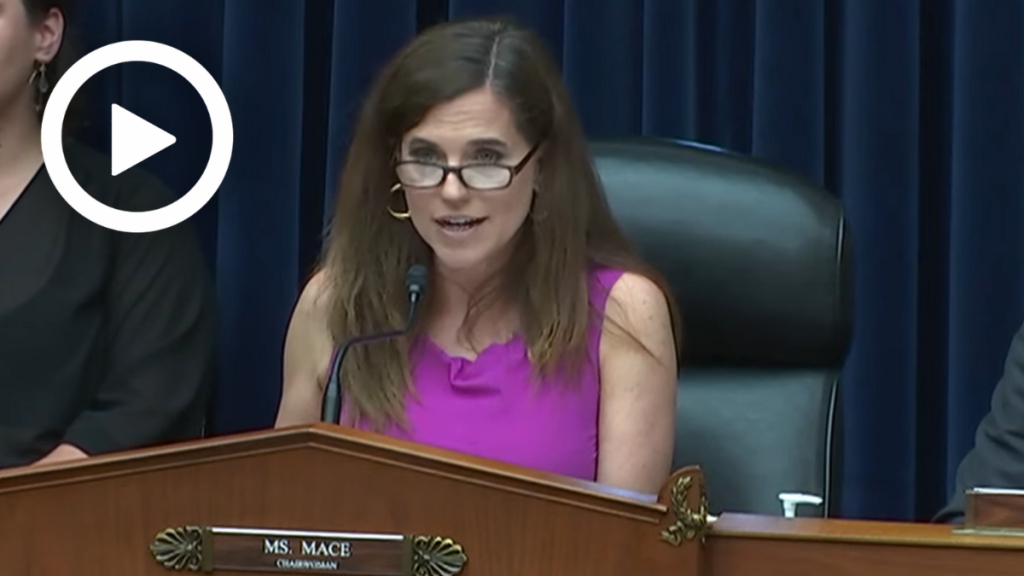Mace: Utilizing Cutting-Edge Tech Will Keep Nation’s Defenders and Citizens Safer
WASHINGTON—Subcommittee on Cybersecurity, Information Technology, and Government Innovation Chairwoman Nancy Mace (R-S.C.) opened today’s subcommittee hearing on “Using Cutting-Edge Technologies to Keep America Safe” by emphasizing how cutting-edge technology helps to protect border security officials, law enforcement officers, and military personnel who put their lives on the line each day to keep Americans safe. Subcommittee Chairwoman Mace highlighted how technology alone cannot remove inherent dangers, but it can help alleviate the demand on manpower by providing agents with tools that enable them to do their job more efficiently. She closed by thanking the witnesses who appeared to discuss some of the technology that is currently being deployed to keep our nation safe.
Below are Subcommittee Chairwoman Mace’s remarks as prepared for delivery.
Good afternoon, and welcome to this hearing of the Subcommittee on Cybersecurity, Information Technology, and Government Innovation.
Today, we’re exploring the use of cutting-edge technology to protect America’s citizens and borders. The innovations we’ll discuss also help to protect border security officials, law enforcement officers and military personnel who put their lives on the line each day to keep the rest of us safe.
We’ll see first-hand today some of the new hardware that’s been deployed. We’ll hear examples of current use cases by federal agencies—and what sort of innovations could be coming around the corner.
Many security-related innovations are first acquired by the U.S. military. These are then adapted and adopted by other parts of government, such as U.S. Border Patrol and other law enforcement.
We’ll hear how robotics, scanners, and drone technology are being put to good use at the border today.
We’ll also discuss what may be coming tomorrow.
At this subcommittee’s first hearing this year, we heard from experts about how recent developments in artificial intelligence will change the way we live and work. They said AI could revolutionize many fields.
One such field is security operations. Former Google CEO Eric Schmidt testified to this subcommittee how critical it is to our nation’s defense that we maintain our edge over China in AI development. Our military has for years worked to find ways to harness AI to enhance our warfighting capabilities.
The reality is that the capabilities of robots, drones, scanners and other security hardware may be supercharged by advances in AI. And the implications of that go well beyond warfighting.
That’s why I recently wrote to Department of Homeland Security Secretary Mayorkas to find out how his agency intends to use AI to stop the flow of illegal immigrants and drugs across the southern border.
I’ve also personally spoken with border patrol officials about how they are using biometrics at the border, and how artificial intelligence can help enhance the effectiveness of the existing technology.
Guarding the border is hard, dangerous work. It often requires relocating to a remote area. Increasing the burden this can put on morale are the lax policies and weak leadership of the current Administration.
The leadership of the Department of Homeland Security should be as invested in the border patrol’s mission as are the dedicated agents patrolling the southern border. Unfortunately, that is not the case. And it’s a situation that must change.
Meanwhile, it should surprise no one that the border patrol is struggling mightily with recruitment and retention.
Technology alone cannot resolve the situation, but it can help alleviate the demand on manpower by providing each individual agent the tools that enable them to do their job more efficiently.
We in Congress can help make that happen. We can help ensure that the most effective new security technologies the private sector develops gets into the hands of border patrol and others in federal law enforcement.
That requires ensuring federal agencies are acquiring the best technologies developed by the private sector in a timely and cost-effective manner.
It means ensuring agencies are working with small, nimble innovators as well as large, established contractors.
It means ensuring red tape and other entry barriers are not preventing newcomers from competing to provide security products and services.
I am pleased that we have witnesses here today who have volunteered to come forward and share with us directly some of the hardware that’s currently being deployed to keep the nation safe.
It’s my hope that this hearing will provide members a better appreciation of the value proposition these technologies bring today—as well as their future potential.
With that, I yield to the Ranking Member of the Subcommittee, Mr. Connolly of Virginia, for his opening remarks.
